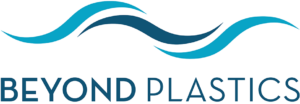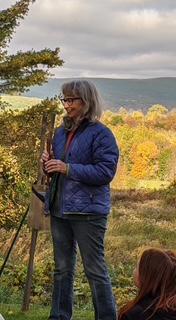By Julie Mackaman

Earth Day celebrates its 55th anniversary on April 22, the centerpiece of a month of activities that honor the birth of the U.S. environmental movement in 1970, the progress made so far, and the daunting work that lies before us, nationally and globally. AAUW and the Unitarian Universalist Fellowship join forces for an Earth Week program that asks: How did the 1960s, ’70s, and ’80s spawn a generation’s relationship with plastic, what’s at stake as plastics pollute our planet — and what can we do about it today?
Beyond Plastics, based at Bennington College under the leadership of Judith Enck, is a nationwide movement whose mission is to reduce and then eliminate plastic pollution. Guest speaker Deb Burns underwent the Beyond Plastics training, which pairs expert knowledge and experience with grassroots advocacy. The program has become a model for helping concerned community members get up to speed on an issue and apply their passion and creativity toward effecting change.
Earth Day is a chance to look back at past decades, consider our tumultuous present, and work toward a healthier future for our planet. For post-war Baby Boomers, it’s an opportunity to consider how, from childhood on, we experienced the arrival and then dominance of plastic in our daily lives. Deb will invite us to conjure up our mothers’ kitchens, recall the products and packaging of pre-plastic times, and then chronicle how plastic crept into our lives, eliminated previous resources, and became entrenched and essential.
The downside of plastics — the pollution of our air and water and even our bodies, and its permanence — has only been recognized in recent years. We now know that plastic bags are used for an average of 12 minutes but can last for more than 500 years. Every minute, one million single-use plastic water bottles are bought around the world, but at best, only a third of them will be recycled.
“Beyond Plastics: A Journey of a Generation” opens with an audience conversation with Deb about growing up with plastics, from our mothers’ kitchens to our own households and our own choices (cloth diapers or Pampers ). Deb will then share the presentation she created as part of her Beyond Plastics training, which has made her a popular in-person speaker at local libraries, schools, and other community groups, and a virtual presenter outside our region and in Canada.
The program concludes with a group discussion and then conversations over refreshments about the challenges and opportunities ahead, as individuals and as a generation, as we consider our role in not only eliminating plastics from our environment but also addressing other critical issues that are shaping the world we will leave to future generations.
A Word about Beyond Plastics
Professor Judith Enck, an environmental policy expert who was appointed by President Obama to be a Regional EPA Administrator, founded Beyond Plastics in 2019. The nonprofit organization’s mission: to activate the changes needed across the board “to save our planet, and ourselves, from the negative health, climate and environmental impacts of the production, usage and disposal of plastics.”
The Beyond Plastic movement has sounded the alarm about the environmental damage caused by plastic creation, use, and waste. Solutions that sound promising — such as bioplastics, compostable plastics, waste-to-energy incineration, and chemical processing of plastic waste — give false hope that technology will help us put plastic waste back into Pandora’s Box.
If pictures of islands of plastic floating in the open ocean and mountains of plastics growing in pockets throughout the world make you feel powerless, Beyond Plastics and this Earth Week conversation are here to help.
A Word About Deb Burns

Williamstown resident Deb Burns is well known to AAUW members for her musical contributions during our Suffragist Centennial programming and through our holiday parties as the whistle player and sing-along leader with the fiddle tune band Rosin the Beaux. She explains that while she is neither a scientist by training nor a plastics expert, like many in the environmental movement, she brings her training in other fields — in her case, as a journalist, historian, and artist — to her citizen engagement as an educator and advocate. She is eager to hear the stories of others who also went through the plastics revolution and are figuring out how to deal with its consequences today.
Return to Newsletter
